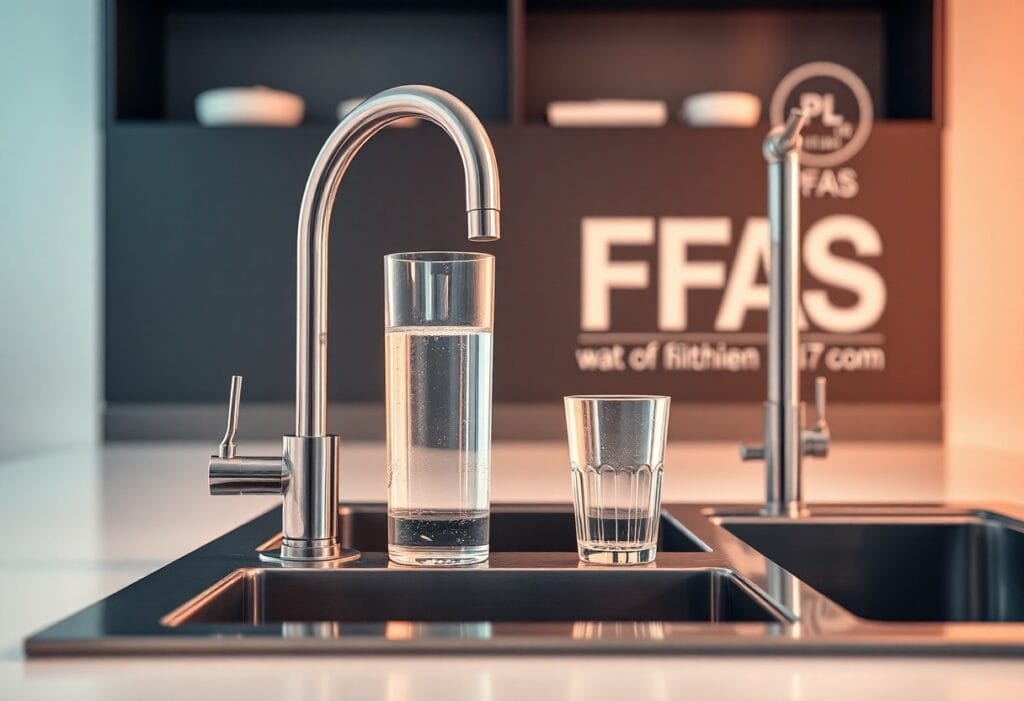Many homeowners are concerned about the presence of PFAS chemicals in their drinking water, given their links to serious health issues. You might wonder if your home water filter can effectively reduce or eliminate these harmful substances. In this post, we will explore the effectiveness of various home water filters in tackling PFAS contamination, helping you make informed choices for your family’s safety. Understanding the capabilities and limitations of different filtration systems is crucial for ensuring the quality of the water you consume daily.
Understanding PFAS Chemicals
Your understanding of PFAS chemicals is necessary, as these substances have garnered attention for their widespread presence and potential health impacts. PFAS, or per- and polyfluoroalkyl substances, are a group of human-made chemicals known for their resistance to water and grease. From nonstick cookware to water-repellent fabrics, PFAS are commonly found in numerous household products, leading to their accumulation in the environment and drinking water sources.
Definition and Types of PFAS
Below is a snapshot of PFAS types and their common applications:
| Type | Application |
| PFOS | Stain-resistant carpets |
| PFOA | Nonstick cookware |
| GenX | Aqueous film-forming foams |
| PFDA | Food packaging |
| FOSA | Industrial products |
Any understanding of PFAS types can help you navigate their implications for health and safety.
Health Risks Associated with PFAS
Chemicals like PFAS have raised concerns due to their potential adverse health effects. Exposure to these substances has been linked to serious conditions, including kidney and testicular cancer, liver damage, thyroid dysfunction, and immunotoxicity. With many people unknowingly exposed to these contaminants through water and food, awareness is necessary.
PFAS can have significant health impacts, as studies indicate that prolonged exposure may increase the risk of chronic diseases. High levels of PFAS in your body may lead to disruptions in immune function, reduced effectiveness of vaccines, and increased cholesterol levels. Most worrisome are the potential links between these chemicals and certain cancers, representing a growing concern for public health. Your knowledge of these risks is important in making informed decisions regarding your water quality and filtration options.
Types of Home Water Filters
While choosing a home water filter, it’s crucial to understand the different types available. Here’s a breakdown:
| Type | Description |
| Activated Carbon Filters | Utilizes carbon to absorb contaminants, including some PFAS. |
| Reverse Osmosis Systems | Employs a semi-permeable membrane, removing a wide range of impurities. |
| Distillation Systems | Heats water to create steam, leaving contaminants behind. |
| Ion Exchange Filters | Exchanges harmful ions in water for less harmful ones. |
| Whole House Filters | Filters water at the main supply, ensuring clean water throughout your home. |
The choice of filter depends on your specific needs and the contaminants you wish to target.
Activated Carbon Filters
Below, you’ll find that activated carbon filters effectively reduce certain contaminants in your water, including some PFAS chemicals. They work by allowing water to flow through carbon granules, where impurities are absorbed. However, keep in mind that these filters may not remove all PFAS compounds, making it crucial to assess your specific water quality.
Reverse Osmosis Systems
Below, reverse osmosis systems represent a powerful solution for achieving clean drinking water. These systems force water through a semi-permeable membrane, effectively blocking contaminants, including many PFAS chemicals. Often considered one of the most effective purification methods, reverse osmosis can remove impurities as small as ions.
Considering the potential dangers of PFAS chemicals, reverse osmosis systems stand out as highly effective in removing these harmful substances from your water supply. By utilizing a multi-stage filtration process, these systems can eliminate not only PFAS but also other contaminants, ensuring your drinking water is safer and cleaner. With proper maintenance and filter replacement, these systems can provide you with a reliable source of purified water for years to come.
Effectiveness of Home Water Filters
Some home water filters can effectively reduce PFAS levels, but their performance varies significantly based on the technology used. Activated carbon filters, reverse osmosis systems, and ion exchange filters are among the most commonly used types capable of diminishing PFAS concentrations in your drinking water. However, it’s vital to consider that not all filters are created equally; check for certifications to ensure they meet specific removal standards for effective results.
Studies on PFAS Removal Capabilities
Studies have demonstrated that certain filtration technologies, particularly reverse osmosis and activated carbon systems, can significantly lower PFAS levels in water. Research indicates that these systems can achieve reductions of up to 99% for some PFAS compounds, making them viable options for households concerned about contamination. However, not all filters are designed to target every type of PFAS, so you should carefully evaluate lab results before making a decision.
Limitations of Home Water Filters
Between the various technologies available, some home water filters may struggle to remove all PFAS compounds effectively. While activated carbon systems work well for certain PFAS, they may not address longer-chain chemicals adequately. Ion exchange systems can target specific PFAS but may have limitations concerning the volume of water processed, leading to a need for regular maintenance and replacements.
This highlights the importance of understanding the limitations of home water filters regarding PFAS removal. Some filters may only partially reduce certain types of PFAS, leaving potentially harmful chemicals untreated. Moreover, the effectiveness of filters can diminish over time, especially if they are not maintained or replaced as recommended. If you’re depending solely on a home water filter for PFAS removal, it’s vital to stay informed about your filter’s capabilities and limitations, ensuring that your health and safety are prioritized.

Comparison of Different Filters
Keep in mind that not all home water filters are created equal when it comes to removing PFAS chemicals. Understanding the effectiveness of various filter types can help you make an informed decision.
Filter Type | Effectiveness Against PFAS
————————–|——————————————
Activated Carbon | Moderate (Varies by brand)
Reverse Osmosis | High
Ion Exchange | High
Distillation | Moderate
Performance Metrics
The effectiveness of water filters in removing PFAS is measured through performance metrics, such as percentage reduction of specific chemicals and flow rate. You should look for filters that provide third-party testing results to ensure their performance meets your expectations.
Cost-Effectiveness
An important aspect of choosing a water filter is its cost-effectiveness. You want to ensure that the filter not only performs well but also fits within your budget for the long term.
At different price points, the initial cost of the filtration system may vary significantly, but consider the lifetime costs of filter replacements and maintenance. Reverse osmosis and ion exchange filters often have a higher upfront investment, yet they provide superior PFAS removal, making them a worthy choice for your health and safety. Balance your needs with the assurance of safe drinking water, as investing in a quality filter can lead to substantial long-term savings on health-related issues caused by PFAS exposure.
Maintenance and Certification
After investing in a home water filter, ongoing maintenance and ensuring it is certified are important for optimal performance in removing PFAS chemicals. Regular upkeep and selecting a certified filter will help maximize the filter’s effectiveness, aiming for safe drinking water.
Importance of Regular Maintenance
About every filter you choose needs regular maintenance to function at its best. This includes changing cartridges, cleaning components, and following manufacturer guidelines. Neglecting maintenance can lead to decreased performance, allowing harmful substances like PFAS to infiltrate your drinking water.
Recognizing Certified Filters
Any filter you consider should be certified by an independent organization, indicating it meets specific health and safety standards. Look for labels from groups like NSF International or the Water Quality Association to ensure the filter effectively addresses PFAS removal.
Even while shopping for water filters, it’s important to check for certifications that validate their efficacy. Filters with NSF/ANSI 53 or NSF/ANSI 58 certifications are particularly notable, as they confirm the ability to reduce specific contaminants, including PFAS. This approach gives you the assurance you need that your filter meets stringent health standards, ultimately protecting your family’s health and well-being.
Recommendations for Consumers
Unlike standard water filtration systems, it is crucial for you to choose home water filters specifically designed to remove PFAS chemicals. Options like reverse osmosis, activated carbon, and ion exchange systems are highly effective in tackling these harmful substances. Before purchasing, consider obtaining your water quality report and evaluating your individual needs to ensure optimal filtering solutions.
Best Practices for PFAS Reduction
After installing a suitable water filter, consider implementing additional practices to reduce PFAS exposure. Regularly replace filters as recommended, avoid using non-stick cookware and fast food packaging, and ensure to check local water advisories for potential contamination in your area. Adopting these habits can significantly enhance your safety and well-being.
Selecting the Right Filter for Your Needs
Your choice of water filter should be based on the efficiency in removing PFAS contaminants, along with factors such as cost, maintenance, and installation complexity. Consider options like dedicated faucet-mounted filters or whole-house systems based on your household’s water consumption and specific PFAS concerns.
Understanding the various filtration technologies available is key to ensuring you select the right filter for your needs. Look for filters with certifications specifically for PFAS removal; research suggests that products tested against standards established by organizations like NSF can effectively reduce PFOA and PFOS levels. Additionally, assess the cost-effectiveness and longevity of filters, as some may require more frequent replacements. By making an informed choice, you promote better health for yourself and your family.
To wrap up
Summing up, you should understand that while home water filters can significantly reduce PFAS levels, not all filters are equally effective. Your choice should focus on models specifically designed to target these chemicals, such as those using activated carbon or reverse osmosis. Regular maintenance and proper usage are also important in ensuring optimal performance. By making informed decisions about your water filtration system, you can take meaningful steps towards safeguarding your health and ensuring cleaner drinking water.




















